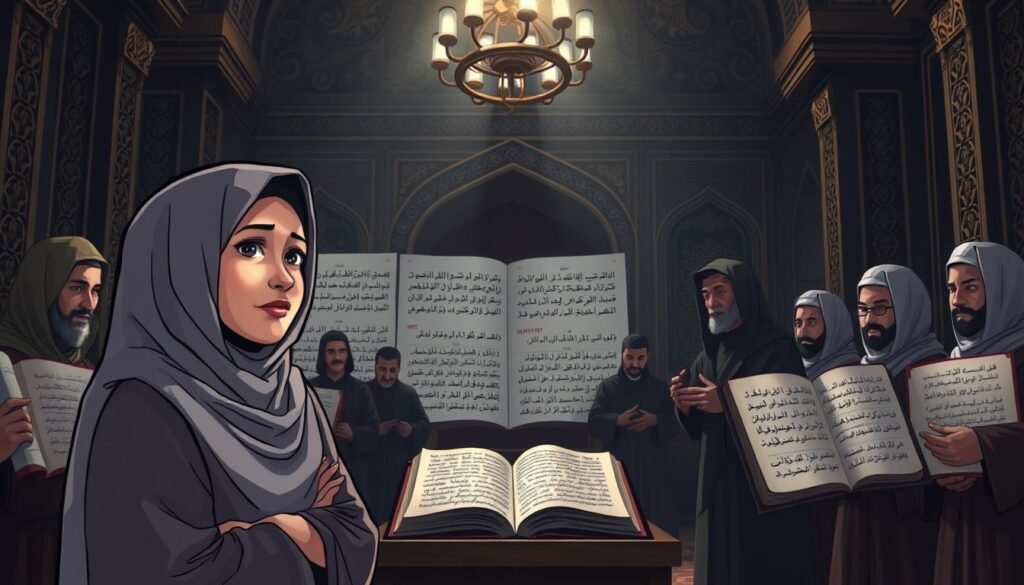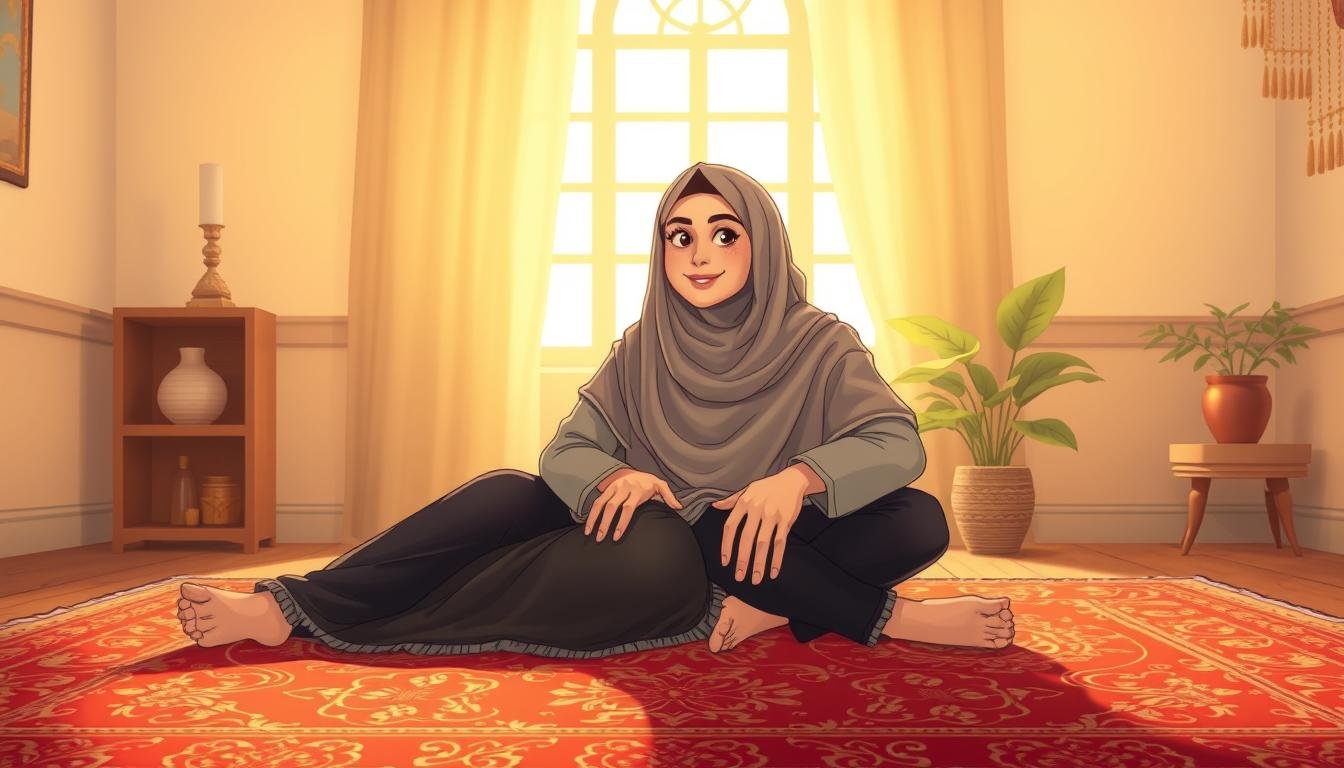Ever felt confused by the Hadith about wife obeying husband? I’ve seen debates over this topic. The Quran and Hadith are often seen as strict rules.
But what do these texts really mean? They’re not just about following rules. They’re about understanding and respecting each other.
Some Hadiths say a woman’s paradise depends on obeying her husband. Scholars like Sheikh Yusuf Estes explain it’s about working together. But, in practice, these teachings are often used to silence women.
How do we balance this with the Prophet’s example? He valued his wives’ opinions and counsel. This shows respect and equality in relationships.
The Quran says men should protect women (An-Nisa’ 4:34). But it also talks about mutual rights. The Hadith about obedience is about devotion, not control. Yet, cultural norms often turn these ideas into strict rules.
At the heart of wife’s obedience in Islam is balance. It’s about respecting each other’s roles while remembering Allah’s authority.
Let’s explore these teachings in their original context. How do we honor Islamic values and equality? The answers might surprise you. They show that true faith is built on mutual respect. Learn how Islamic principles address dignity in and see how ancient wisdom guides us today.
Understanding the Context of Marital Relationships in Islam
Islamic marriage is based on “tranquility, love, and mercy.” It changed old ways of thinking. Islamic marital roles focus on working together, not just following rules.
Early Muslims made big changes. They stopped denying women their inheritance and stopped abandoning children. Women got the right to own property, learn, and be treated with respect.
The Quran says spouses are like clothes for each other. This shows they protect and make each other look good. It’s different from old times when women were seen as property.
The Prophet Muhammad worked with his wife Khadijah. He asked her advice in business and spiritual matters. This shows a partnership, not just one person in charge.
The Islamic View of Marriage as a Partnership
The Quran says spouses are like clothes for each other. This means they work together and support each other. Quran 4:19 tells husbands to be kind to their wives. And Quran 4:7 says men and women are equal in God’s eyes.
This shows that respect is key in an Islamic marriage partnership.
Historical Context of Gender Roles in Early Islamic Society
Before Islam, girls were sometimes killed at birth. Women didn’t get to own property. The Prophet Muhammad changed this.
He banned killing girls and made sure women could own property. This was a big change in 7th-century Arabia.
The Concept of Mutual Responsibilities Between Spouses
Quran 4:34 says husbands must provide for their wives. But wives have the right to say no if they’re not treated right. Both are told to live together with kindness.
This means no one person has all the power. It follows Quran 4:124’s advice to be fair, even if it’s hard.
Examining the Hadith About Wife Obeying Husband in Its Original Form
Understanding the Hadith about wife obeying husband needs careful attention. We must look at its language and history. The hadith says, “If I were to command anyone to prostrate to another, I would command wives to prostrate to their husbands.” This line is often misunderstood.
Translators face a big challenge. They must stay true to the Arabic meaning while making it clear today. Words like “obedience” mean different things now than they did back then.
Original Arabic Text and Translation Challenges
Authentic hadith interpretation begins with the isnad (chain of narrators). This hadith is considered da’if (weak) by scholars like Albani. They say there are missing links in the chain.
Even if it were authentic, its words suggest a point being made, not a command. Debates happen over words like ittiba’. It’s often translated as “obedience,” but it’s more like “cooperation” in marriage.
Linguistic Analysis of Key Terms
Terms like qiwamah (protection) and ta’ah (obedience) need careful study. The Arabic root of ta’ah means working together, not just following one person. It’s about mutual respect, not just obeying.
This hadith is different from Quran 4:1. That verse compares spouses to garments, showing they protect and support each other. Scholars like Amina Wadud say focusing only on obedience misses the Quran’s many verses about men’s duties.
Common Misinterpretations and Their Cultural Origins
Many people misunderstand Islamic marriage because of cultural misinterpretations of hadith. These misunderstandings often put society’s rules above the Quran’s teachings of fairness. For example, the idea that men protect women has been twisted to mean men rule over them. This ignores the Quran’s view of spouses as equals.

In South Asia and the Middle East, old systems made wives seem less important than husbands. This goes against the Prophet’s example of working with his wife Khadijah. Yet, old traditions like keeping women from moving freely or making them obey without question are not based on Islamic law. The Quran asks for fairness in marriage, but this is often ignored.
“The best of you are those who are best to their wives,” the Prophet declared. This wisdom contrasts sharply with practices reducing women to servants or gatekeepers of family honor. Colonial-era legal codifications further entrenched such distortions, conflating tradition with faith.
To understand Islamic marriage equality, we must look at texts in their original context. Hadiths that talk about caring for each other should be more important than old cultural ideas. Scholars say God wants us to treat our wives with kindness, but we often ignore this. By looking at the Quran without cultural bias, we respect both faith and human worth.
The Prophet Muhammad’s Treatment of His Wives as a Practical Example
Looking at Prophet Muhammad’s treatment of wives, we see a model of equality. He showed respect to all, doing tasks like washing clothes and cooking. This broke the idea that men are always better.
He said, “The best of you are those who are best to their wives.” This shows Islamic marriage equality in action.
“The best of you are the best to your wives.”
His marriage to Khadijah was a partnership. She supported him during tough times, showing the Quran’s idea of shared work. They shared meals and played together, showing love and respect.
He valued her opinion, making her a jurist. This shows his respect for her wisdom.
He was always kind. He helped his wives when they were sick and loved to make them laugh. He believed kindness made everything better.
His way of treating wives shows Islamic marriage equality is real. It’s about working together, talking openly, and showing love. His teachings show that a good marriage is built on humility and care for each other.
Other Quranic Verses and Hadiths on Marital Harmony
In Islam, mutual respect in Islamic marriage is key. Quran 4:19 tells husbands to be kind to their wives. And Quran 2:231 says divorce must be done with honor. These verses show respect is important in every interaction.
Think about this Hadith:
“The most perfect believers in faith are the best in conduct, and the best of you are those who are best to their wives.””
The idea of Qiwamah meaning in Islam is in Quran 4:34. It’s not about men controlling women. Scholars say it’s about men’s financial and protective duties. Dr. Ingrid Mattson explains it’s about men providing for their families.
This idea is also in a Hadith where the Prophet said husbands must support their wives. It matches Quran 4:34’s message about men’s responsibilities. For more, see Islamic legal discussions on marriage issues.
Hadiths also talk about women’s rights. Sahih Bukhari says the Prophet okayed a wife keeping her name. Quran 4:7 gives women equal inheritance. These show women have their own rights.
Quran 42:38 says couples should make decisions together. Sahih Bukhari talks about a wife managing her own money. These stories show Qiwamah is about working together, not one person being in charge.
Scholarly Interpretations Across Different Islamic Schools of Thought
Islamic scholars have many views on marriage, shaped by long debates. Ibn Ḥajar and Al-Sharbīnī said we must look at both the words and the situation. For instance, Ibn ‘Abidīn in the Hanafī tradition said a husband can only ask for reasonable things, to keep peace.
Today, scholars like Amina Wadud and Asma Barlas say old laws were shaped by men, not God. They think these laws were made by men, not by God’s word.
“When a man and a woman come together in marriage and live together, there are bound to be differences in opinion between them, and one party must have the final say in order to resolve the issue, and disputes will increase.” — Excerpt from a classical legal treatise
Shī‘a scholars look up to the Prophet for how to agree with his wives. Sufi traditions talk about spiritual equality. The Ḥanbalī school is strict, while Mālikī jurists want husbands to talk to their wives about big choices.
Even among Sunnīs, there are different views. Some old scholars thought hitting was wrong if it hurt, as Sunan Abī Dāwūd 2146 says. Now, Zainab Alwani sees qiwāmah as a partnership, not a rule.

These views show how Islamic law changes with time. Scholars have always tried to balance God’s word and the world’s changes. For example, Egypt’s 2000 law made it easier for women to get divorced.
By listening to all these views, we can find ways to mix old wisdom with today’s problems. The key is to keep talking about scripture, culture, and real life.
Balancing Religious Obligation with Mutual Respect in Modern Marriages
In Modern Islamic marriage, couples today face a big challenge. They must mix old wisdom with new social ideas. The Prophet’s life teaches us kindness and talking things over are key. Yet, many are changing roles without forgetting faith’s basics.
“It is my belief that this [obedience] relates to religious matters, not to trivial issues such as making a cup of tea…”
Changing traditions starts with knowing the difference between culture and Islam. For example, the Quran talks about shared responsibility, not control. In Balanced Islamic marriage, many couples share household duties or co-parent, just like the Prophet did.
Imam Malik and As-Sayyid Sabiq say financial support doesn’t mean a wife can’t be independent. Modern couples are rethinking roles with respect. A Chicago couple I talked to said, “We manage money together and share chores—it’s Islamic, even if it’s different from our parents’ time.”
It’s important to separate culture from the Quran to avoid confusion. The Quran encourages talking things over, which helps in making big decisions. Scholars like Dr. Wahbah Al-Zuhayli say to choose mercy and fairness over strict traditions. This way, Balanced Islamic marriage can be a source of strength, not trouble.
The Prophet’s example shows love grows through talking and understanding each other. By focusing on kindness, trust, and partnership, modern marriages can stay true to faith while adapting. The Prophet said, “The best of you are those who treat their wives well”—a lesson for every time.
When Obedience Conflicts with Moral or Ethical Principles
Islamic teachings set clear limits on following your spouse. They teach la ta’aah fi isyan—no obedience in disobeying God. This rule makes sure Islamic limits on spousal authority come before human wishes. The Prophet said, “There is no obedience to any created being if it involves disobedience towards the Creator.”
“Whoever among you believes in Allah and the Last Day should serve his neighbor and his relative with kindness.” — Prophet Muhammad (ﷺ)
Asiyah, Pharaoh’s wife, is a great example. She chose faith over her husband’s orders. This made her a martyr in Islamic history. The Quran praises her for standing firm (Quran 66:11–12). This shows that following God is more important than following your spouse.
Husband’s rights in Islam include taking care of his wife and protecting her. But these rights have limits. Scholars say a husband can’t ask his wife to ignore her prayers or be immodest. For example, not providing for his wife is wrong (Quran 2:233). But following God’s commands is always more important.
Today, families often face choices between cultural norms and Islamic values. A wife doesn’t have to do something that goes against the Quran. This way, marriage is based on respect and understanding, not just following rules. The Quran says fairness is key in all relationships (4:19).
How Contemporary Muslim Families Navigate These Teachings
Today, Islamic families mix old teachings with new life. Couples in North America see modern Islamic marriage as about respect, as the Quran says in 4:1. They face issues like high divorce rates but look to the Prophet for help.
They use examples like the Prophet’s talks with Aisha to solve problems. Money issues are handled by working together, following the Quran’s advice in 4:19.
Even though 70% of couples don’t get premarital education, those who do find stronger marriages. They learn from resources like spousal responsibilities. Young couples value talking openly, blending Quranic teachings with fairness.
Dual-income families see “provision” as a shared task, keeping both partners involved. This approach respects the Quran’s teachings on guardianship.
Modern families deal with cultural differences by focusing on support, as the Quran suggests in 2:187. A 2023 study found 68% of couples have weekly family meetings, just like the Prophet’s household.
Despite challenges, the teaching that “the best of you are those who treat their wives well” (Bukhari) guides them. It shines a light on the evolving Islamic family structures.
FAQ
What does the hadith about wives obeying husbands actually mean?
How does the Quran describe the relationship between spouses?
What cultural practices have influenced interpretations of the hadith?
How did Prophet Muhammad treat his wives?
What is the concept of "qiwamah" and how is it commonly misunderstood?
How do various Islamic scholars interpret obedience in marriage?
Can a husband demand obedience that contradicts Islamic principles?
How are modern Muslim couples adapting these teachings?

Embracing Faith, One Insight at a Time!
The teachings of the Quran have always guided my path. With a deep passion for Islamic knowledge, I strive to blend the wisdom of tradition with the relevance of today, making the timeless messages of Islam accessible and meaningful for everyone.
Muslim Culture Hub is my platform to share historical insights and thought-provoking articles, exploring both well-known and lesser-discussed aspects of Islamic culture and beliefs. My mission is to create an inclusive online space where everyone can learn, strengthen their faith, and connect with the profound message of Islam.
Join the journey!
May peace be upon you.








